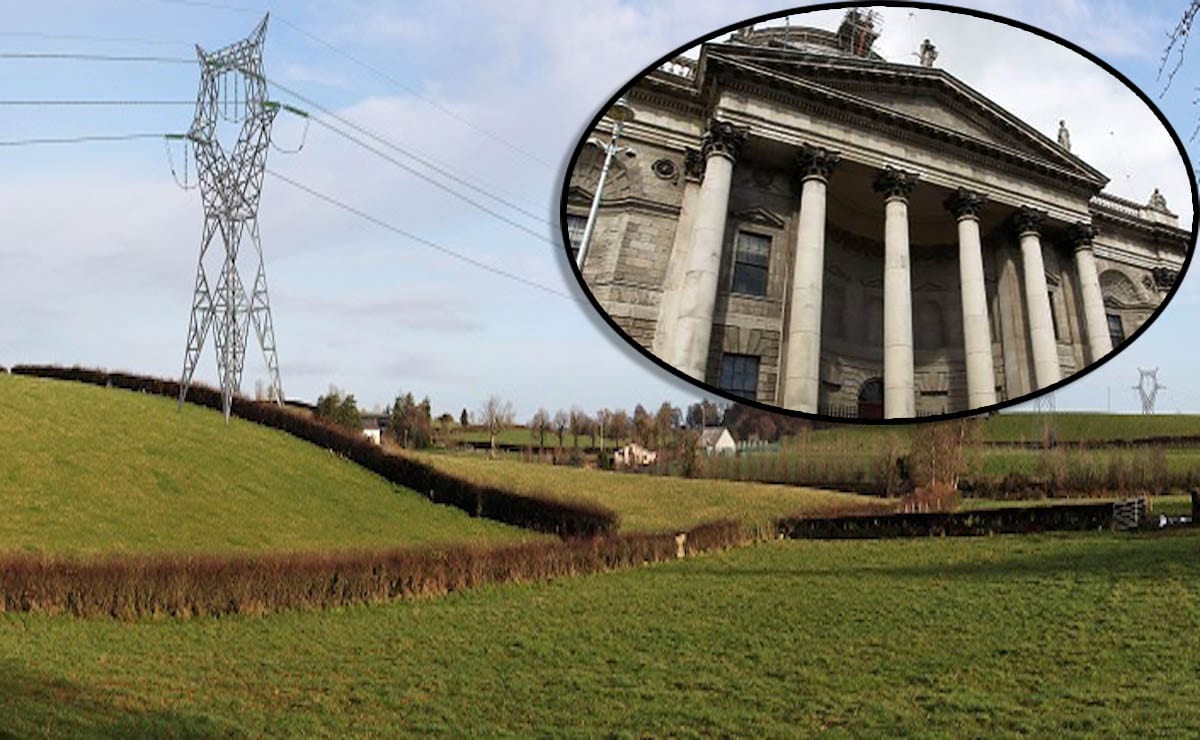
Campaigners opposed to an overhead electricity interconnector, stretching across Counties Armagh and Tyrone, have launched a legal challenge against the Government’s handling of the controversial application.
The North-South Interconnector was given full planning approval for the 400kv facility seven years ago.
The move angered representative of lobby group SEAT (Safe Electricity Armagh Tyrone), which had been formed to give voice to concerns when the major network structure was first mooted almost 20 years ago.
Now a spokesperson said: “We look forward to having our day in court.”
SEAT says it came together to vent the concerns of some 6,500 local residents in close proximity to the route of the proposed overhead North-South Interconnector.
Since this interconnector was first proposed, the group has questioned the need and value of this infrastructure, and the methods in which SONI has engaged with residents in the area.
SEAT issued Judicial Review proceedings against the North-South Interconnector before the High Court in Belfast on Monday, December 9.
These proceedings will challenge a number of decisions of the Department for Infrastructure relating to the planning process and the discharge of pre-commencement conditions within that process.
Taking account of the ongoing proceedings, SEAT has also called on Minister Conor Murphy to direct that the “wayleave applications being vigorously pursued against the innocent landowners of Armagh and Tyrone by his Department for the Economy are stopped until these proceedings have reached their conclusion”.
In light of the recent proceedings, a SEAT spokesperson said: “Throughout the lifetime of the group’s existence we have become increasingly concerned for every electricity bill payer in Northern Ireland.
“When the proposal was first put forward in 2005 some 6,500 objections were registered against this proposal. SONI has recently claimed ‘this project is costing consumers £55,000 for every day it’s not built’. Not only does SEAT dispute the accuracy of this unsubstantiated figure provided by SONI, but we believe that the construction of this interconnector will actually cost electricity consumers throughout Northern Ireland.
“Evidence of this increased cost can be seen clearly in the recent RP7 Price Control Determination issued last month, with each household footing the bill amounting to as much as £10 increase per customer per year. In a cost of living crisis currently faced by Northern Irish consumers, this increase is a total disgrace.
“The energy consumption of data centres in Dublin has been well documented over the past number of months, with data centres now accounting for 21% of all electric use in the Republic of Ireland; Northern Irish consumers are now being left to foot this electricity bill through the creation of the North-South Interconnector.
“If the North-South Interconnector goes ahead the reality is that renewable energy being produced in the west of Northern Ireland, which could be used to power industry and commerce throughout NI, could be funnelled through this planned interconnector to power Dublin based data centre expansion.
“An upgrade to west to east grid infrastructure in Northern Ireland would address the current renewable constraints and provide for cheaper electricity bills for Northern Irish consumers. We believe the response by the Northern Ireland Utility Regulator and the worrying and continuing silence of NI politicians on this issue is deafening.”
SEAT said it had initiated legal proceedings, “not just on behalf of some 6,500 local residents and landowners but on behalf of all electricity consumers in Northern Ireland”.
The spokesperson also cited health fears if the project proceeds as planned.
“Our concerns as residents in proximity to the proposed route remain as grave as they were when our campaign began,” they added.
“Health risks from being in close proximity to infrastructure such as this proposed interconnector include a twofold increase in risk of childhood leukaemia among children with exposures of 0.4 μT or higher, as reported by the National Cancer Institute. Our concerns regarding health have never been satisfactorily addressed and they remain a significant worry.
“In a recent press release, paid for by your taxes, SONI took the opportunity to reject SEAT’s belief that if such an interconnector was needed, it could be undergrounded, as overhead lines are ‘lower cost’. Underground interconnectors are used elsewhere, including the Kildare-Meath line, yet the residents of Armagh and Tyrone are being treated as second-class citizens with an enforced overhead interconnector that brings with it such health risks and creates an environmental blight on a 1km wide strip through some of the best farming land in Northern Ireland.”
The group insists local landowners remain just as opposed to the proposals today as they did when the interconnector was first brought to the table.
The spokesperson added: “SONI has previously claimed that it has engaged ‘extensively’ with those who are opposed to having this infrastructure built on their land, and that SONI has ‘a good number of landowners signed up’. As the voice for these residents, SEAT knows the reality is that most landowners have not and never will sign up to this process, the majority of the land owners are opposed to the North-South Interconnector will prevent any attempts to commence works on their land.
“The people of Armagh and Tyrone will continue to stand together and these proceedings are another example of their enduring opposition to the project, which remains as strong today as it did in 2005.
“SONI continues to push this unwanted and unnecessary project on us, but through concern for the health and wellbeing of ourselves and our families; and of protecting the pockets of consumers right across Northern Ireland, SEAT will never stop opposing this interconnector and in the end, we will prevail.”





